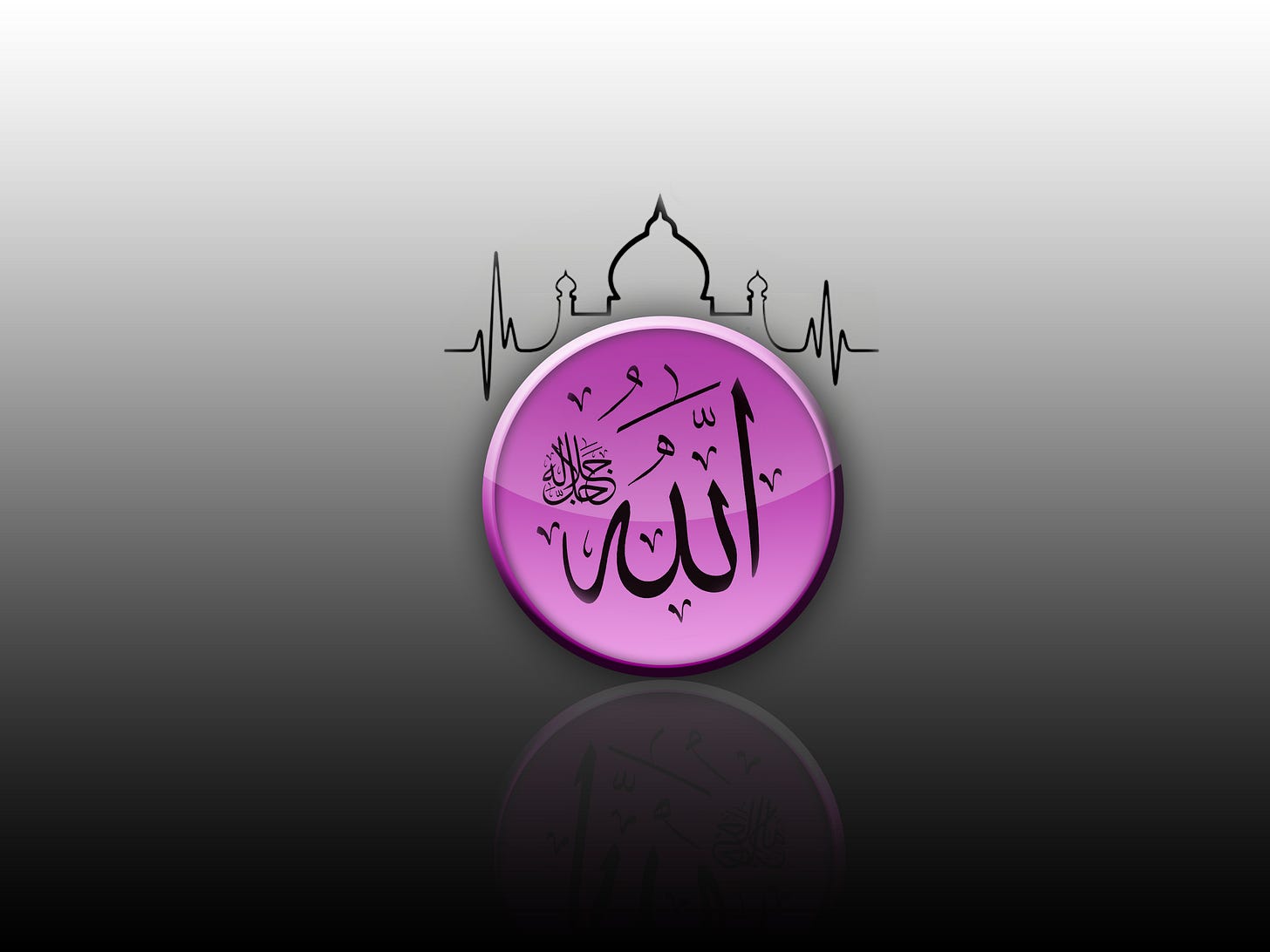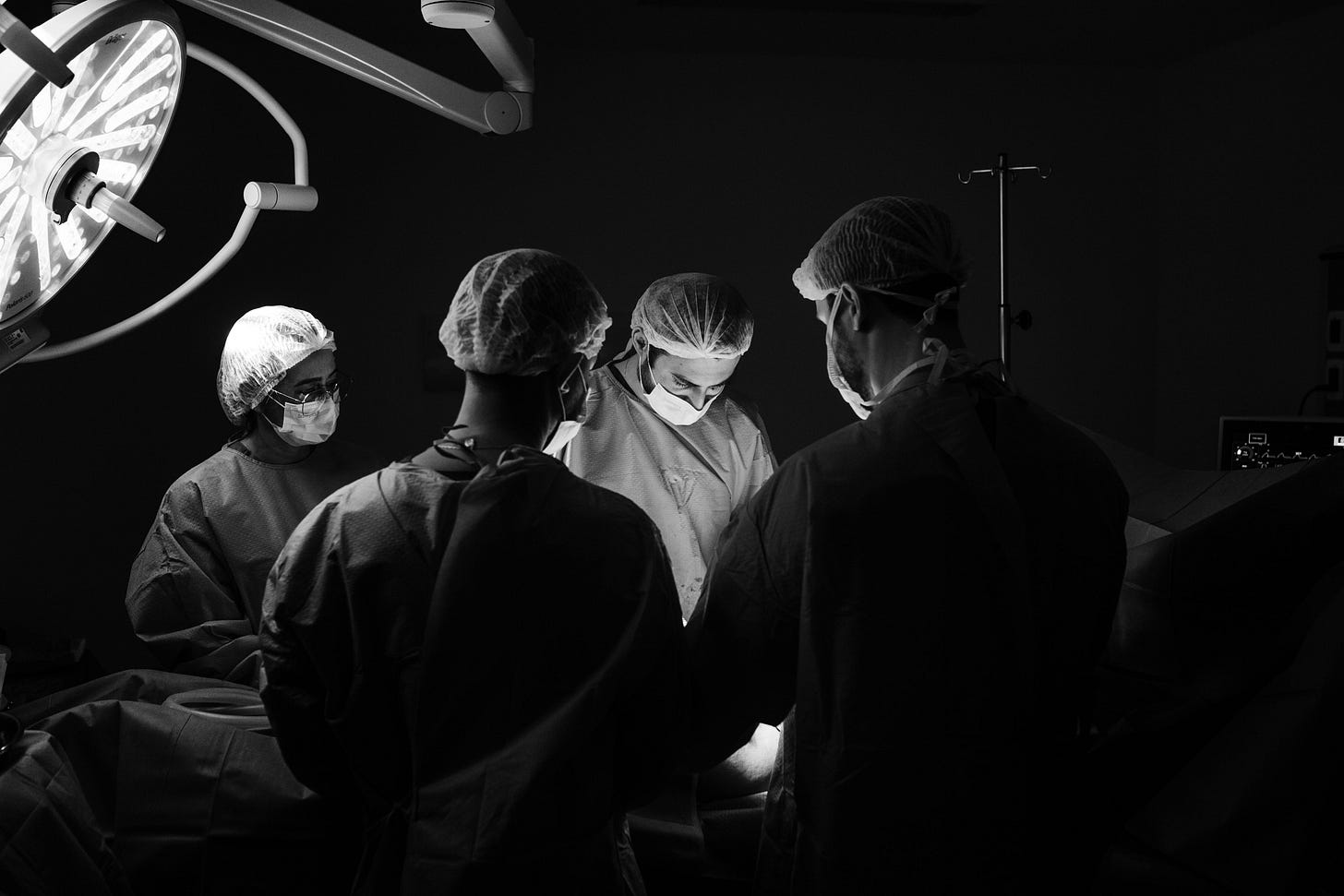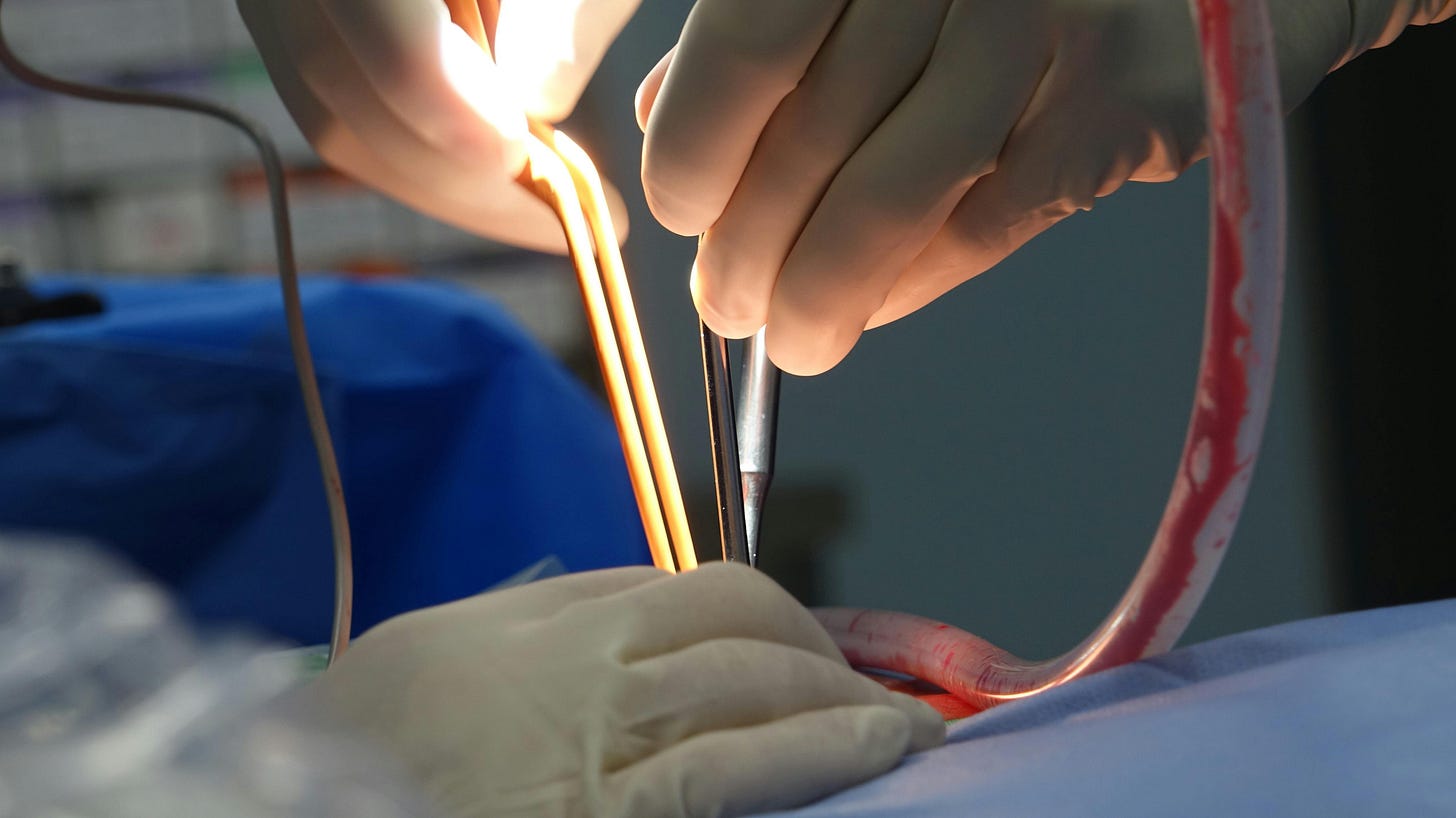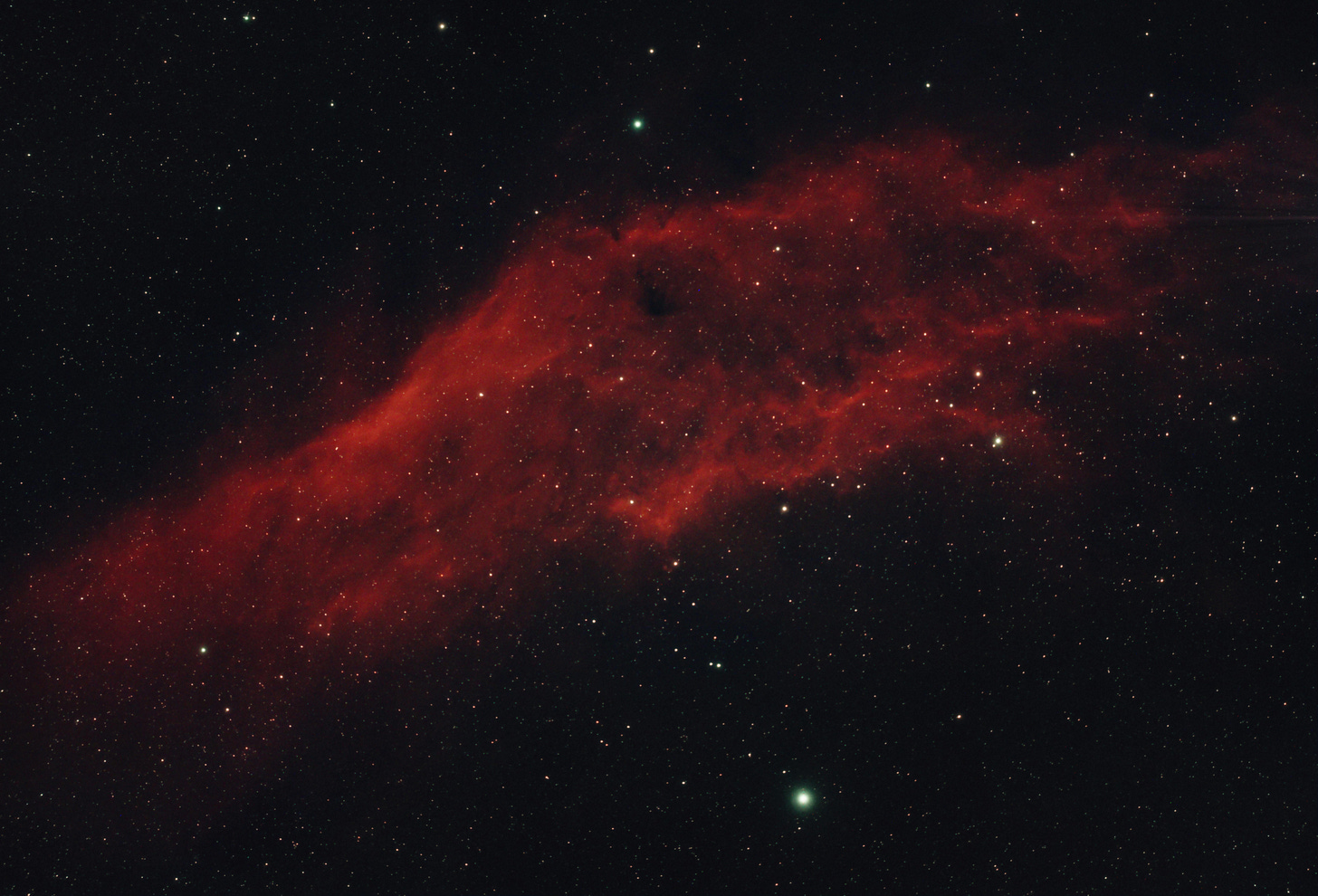Whispers in the Dark — Part Two
Anything is Possible When Allah Wills It
﷽
This is Part Two of a three-part series. If you haven’t read Part One read here, I recommend starting there to understand the full story.
Though written in a storytelling style, this is not fiction. Every word is drawn from real events, a real illness, and a very real battle for my soul. I chose to frame it in narrative form so you could step into the experience — the darkness, the whispers, and the mercy that carried me through.
Morning
I woke from what felt like an eternal slumber, the kind of sleep where time itself dissolves, and when my eyes opened the December wind was still pressing against the window, gentler now, like a tired sigh after the storm. My gaze fell again on the sprout on the windowsill — it looked battled, yes, weathered by the night, but to my amazement it still stood, taller than before, as if the very storm had made it stronger.
My phone was clutched heavy in my hand, the screen light being swallowed by the sun bathing in my room. It was 7:30 a.m. Nearly twenty-four hours since the pain began. I told myself I would wait thirty more minutes until my GP’s office opened at eight.
Istikharah dua (prayer for guidance) had by then become my oxygen. I prayed it for decisions as small as whether to buy milk at the market, and as shattering as ending a marriage to a man I still loved, because I knew Allah would not be pleased if I clung to what He had shown me to release.
So I prayed again, whispering the words I had memorized by heart:
اللَّهُمَّ إنِّي أَسْتَخِيرُكَ بِعِلْمِكَ، وَأَسْتَقْدِرُكَ بِقُدْرَتِكَ، وَأَسْأَلُكَ مِنْ فَضْلِكَ العَظِيمِ، فَإِنَّكَ تَقْدِرُ وَلا أَقْدِرُ، وَتَعْلَمُ وَلا أَعْلَمُ، وَأَنْتَ عَلَّامُ الغُيُوبِ…
O Allah, I seek Your guidance by virtue of Your knowledge, and I seek ability by virtue of Your power, and I ask You of Your great bounty. For You have power, while I have none. You know, while I know not. You are the Knower of the unseen…
And as always, sakinah poured over me, my heart settled, my breath steadied, and I felt anchored once again.
At 8:30 a.m. the bell rang.
“It’s the doctor,” my family member called.
Sophie entered, the light following her in. Our eyes met and tears streamed down my face — I was no longer the woman who had always carried strength on her shoulders, I was a little girl again, crying because it hurt too much.
“I need to examine you, Ms. Cauveren,” she said.
And in the voice of my five-year-old self I whispered, “Please don’t hurt me. Your colleagues already hurt me.”
Indignation edged her words. “My colleagues are heavy-handed.” She had read their report, disagreed, and her honesty, sharp as it was, comforted me.
Her touch was soft and gentle like my Mama’s touch.
“Ms. Cauveren, you need to go to the hospital now. I’m calling an ambulance.”
She called the emergency operator and gave my details, name, address, DOB, before turning slightly away, hand covering her mouth as she whispered into the phone: “Book a bed in for surgery.”
Dhuhr
The ambulance arrived within minutes — the hospital only a few streets away, but each turn of the wheels felt like an eternity.
A young Dutch surgeon with thick brown hair and piercing blue eyes examined me. His smile — polite, professional — vanished the moment his hand pressed against the storm within me.
“Ms. Cauveren, I’m booking a CT scan right away. We’ll take good care of you.”
But Allah already was taking the best care of me!
Two female radiologists came to collect me, one tall with dark hair, her smile tender, the other shorter, rounder, with long blonde hair and a warmth that glowed. They guided me gently, spoke casually to reassure me, but when the scan finished and the images appeared, I saw their silence.
Through the glass they looked at one another. Their eyes tightened, their smiles dissolved, their gaze avoided mine. I knew. Their eyes saying, “she’s not going to make it.”
Back in the emergency room, the surgeon too no longer met my eyes.
Ms. Cauveren you need to have emergency surgery now. You’re going to be picked up in a few minutes and taken to the ward. I need to explain to you what may happen. These are worse case scenarios.
He explained three possible outcomes:
Severe complications that might leave me a lifelong patient.
Laparoscopic surgery failing, requiring a deep, open incision.
His words faltered, vague, hesitant.
“Doctor, what’s option three? You haven’t explained well.” I knew but it wasn’t the time for educated guesses and I wanted the dignity of being told!
He lowered his gaze, his words soft but firm: “It means when we open you up, we see we cannot do anything. We close you back up… and wait for you to die.”
He braced himself for my reaction.
But another wave of sakinah washed over me like a tide. “Thank you,” I said calmly. “I understand.”
Just then my wali arrived. The surgeon pulled him aside, explaining again. My wali tried to stand calm, protector-like, but his eyes betrayed the storm within him.
I reached for my rock, the one I always carried, and performed tayammum. I prayed Dhuhr and my heart stilled into peace.
I turned to him and said, “Promise me you will make my siblings care for my family member (a sick relative living with me at the time, for privacy referred to as family member).
“And my kafan — the death shroud you brought from Egypt — it’s in the living room closet, top shelf. My jannazah (Muslim funeral ) insurance is in my purse, here I said reaching for my wallet. You’re the contact person. Make sure I am buried as a Muslim.”
His voice cracked. “Nour…” he whispered, then gave a submissive nam (Arabic for yes), lifting his hands in dua.
Asr
They wheeled my bed away, my wali walking beside me, his lips wet with dua. He was supplicating to Allah for me! Those whom love you call out to Allah for you Yaqeen! The adhan for Asr echoed faintly through the halls, a reminder that even here, among white walls and steel carts, the world bows to Allah.
At the ward the nurse said I would be taken to pre-op in ten minutes.
“I want to shower,” I said.
“No, Ms. Cauveren, you don’t have time.”
“I might die, I said firmly. “I want to perform ablution, so that if I meet Allah, I meet Him in a pure state.”
She hesitated, then nodded quickly. “Okay. But hurry.”
With trembling hands I performed ghusl, each drop of water a supplication, each motion a plea. I honestly don’t know how I had the strength! But Allah expands our capacity when we need it most! Allahu Akbar.
Maghrib
The ten minutes stretched endlessly, a delay unexplained. But by Allah’s mercy Maghrib entered before they came, and I prayed, grateful that even at death’s edge, salah had not left me.
Since that Tahajjud, the day before, Allah had allowed me to pray every salah on time. SubhanAllah. Islam is ease — if there is no water, then tayammum; if you cannot prostrate, then sit; if you cannot sit, then pray lying down.
In my desperation, in my weakness, salah was my rope — my anchor, tying me to my Lord.
Just as I was finishing Maghrib, a nurse and orderly came for me. It was the first time of what would be many times my salah would be interrupted by a nurse. I stayed steadfast, finished, and he apologized afterwards, saying, “I should have known you were praying.”
All along I reminded my wali: “take care of my family, make sure my siblings help, make sure I am buried as a Muslim. I love you for the sake of Allah. May Allah gather us in Jannatul Firdaus جنۃ الفردوس Ameen.” Between his repeated nam (yes), he kept making dua for me. Ya Allah, reward him and give him more than what he asked for me, ameen.
“Sir, you are not allowed beyond this door,” the nurse told him. “It’s time to say goodbye.”
I closed my eyes and allowed the peace and tranquillity to enter me feeling the presence of Allah’s malaʾika (angels) had been sent to protect me. Allah knows best.
In pre-op I met my surgeon. At once I felt reassured. I looked at the team around me, the way they moved and spoke, and I knew Allah had answered the dua I made after Maghrib: “Ya Allah, give me the best team.”
The surgeon’s gentleness, his protective nature, the way he repeated my allergy to Tramadol to the anesthesiologist, intervened when they struggled to find a vein, watching over every detail — all of it told me my dua had been answered.
At that moment my focus turned towards my final words which I prayed would be Lā ilāha illallāh.
The Prophet ﷺ said:
“Whoever dies while knowing that there is no deity except Allah will enter Paradise.”
(Sahih Muslim, 26)
So as they wheeled me into the OR, I repeated it. “What’s your name?” — “Nour Cauveren. Lā ilāha illallāh.” “What’s your date of birth?” — I gave it, and then, “Lā ilāha illallāh.” With every question, I answered and then said it again. In my heart: Ya Allah, let my last words be Lā ilāha illallāh.
And as the anesthesia pulled me under, my last words were: Lā ilāha illallāh.
Isha
“Ms. Cauveren, Ms. Cauveren.” A voice was distant at first, then closer, until I opened my eyes.
A sharp, dull pain spread from the incision across my body. Option two was no longer a possibility — it was my reality.
But I was alive. “Alhamdulillah, alhamdulillah,” I whispered, turning my eyes to Dr. da Castro. His brown eyes were gentle and warm. “Thank you. Thank you so much. I’m grateful,” I whispered.
His eyes filled with tears. He took my hand softly. “Aww, you’re going to make me cry,” he said.
For a moment I wondered if I should tell him I was a Muslim woman and not to touch me, but my strength was too fragile. I forgave him, asked Allah to forgive both of us, and let it go.
As my bed was wheeled to the ward, I caught the clock: five and a half hours had passed. SubhanAllah. Then I saw my younger brother. “Hi, little brother, Ayesha and Fathima, so great to see you!” I managed. But the effort drained me. I closed my eyes, exhausted, while Dr. da Castro explained to my younger brother: the surgery had been more than double the time expected, complex beyond measure.
That night I dreamt.
The Dream

In Islam, dreams can be true, from Allah, or false, from Shaytan. This dream I believe was true — Allah knows best.
I drifted weightless, pain falling away like a garment I no longer wore, and a tunnel opened beneath me — greenish-yellow light pulsing on its walls like breath, drawing me downward, down and still further down. The air smelled damp, like earth after rain, and the surface beneath me was not a floor but a smooth slide, carrying me toward a destination I already knew. This was the path to my grave.
I wasn’t dead — not yet — but each downward pull pressed that possibility closer against my skin. My heart tried to shout Lā ilāha illallāh, but my tongue lay in my mouth like stone, heavy immovable, as though the words themselves weighed more than I could lift.
I remembered then what I had once learned: no tongue moves without Allah’s permission. Only He allows a servant to utter His Oneness at the final breath. In my heart I begged, Ya Allah, make it light on my tongue.
In that instant, the iron turned to feather. My tongue loosened, and the words slipped free, carried on the air like a bird breaking from its cage: Lā ilāha illallāh…
The tunnel reversed. The pull that had dragged me down now flung me upward with a force that stole the air from my lungs. The light rushed past me, brighter, whiter, until I was expelled from the tunnel like a diver bursting through the surface of the sea.
I gasped.
The stale air of the hospital ward filled my nostrils. The beeping of machines cut through the silence. Sweaty sheets clung to my skin. My hospital room swam into view.
Dunya had returned — or I had returned to it.
But everything felt strange now, like waking from a dream into a reality that didn’t quite fit, a world both familiar and foreign, solid and unreal all at once.
Aftermath
The next day I began to learn the rhythm of the hospital — its ecosystem of routines and questions. Physical vulnerability is a strange indignity; you must give yourself over to nurses. I could not wash alone, use the restroom alone, even lock the door.
Each morning came the rounds. “How is eating going?” the resident would ask — a tall, blonde Dutchman and a younger Portuguese woman, dark-haired, around twenty-seven.
“It’s not going well,” I’d say. “I’ve only eaten one egg. I immediately feel full.”
The answer was always the same: “Everything looks fine.”
“I don’t feel fine. Something is seriously wrong.”
Like the two doctors who misdiagnosed me, no one listened!
Something was very wrong.
By Friday I was discharged. Within twelve hours of being home I was weaker than before. I called the hospital. The surgeon’s voice was casual, almost dismissive. “It’s busy. You’ll have to wait a long time. But you should come in.”
“That’s fine,” I said aloud. In my heart: My Lord won’t make me wait. Allah will do what is best.
My sister in Islam, Fathima, picked me up. She made a wrong turn — fifteen minutes lost — but I told her calmly, “Allah’s timing is best.” I knew Allah was clearing the ER for me.
And when we arrived, it was empty, except for one little girl clutching her injured hand. The receptionist took one look at me and called immediately for a wheelchair. Within minutes I was back in the same bed I had been in six days earlier.
The surgeon examined me, still skeptical, until he pressed the wound. His face changed instantly. “We’re booking a CT now.”
After the scan, I overheard him on the phone with Dr. da Castro. “I don’t know how this is possible. This shouldn’t be possible.”
The attending surgeon came back to me after the call with Dr. da Castro, his eyes still unsettled. “We don’t know how this is possible. It looks like you have the same problem which is unheard of right after surgery. Dr. da Castro is certain he repaired the damage. It shouldn’t be possible, but it is. We cannot risk another surgery. You most likely would not survive.”
He looked at me with disbelief.
I turned to Fathima, and I saw in her eyes the same thought as mine. I turned back, smiled, and said calmly: “Anything is possible when Allah wills it.
The surgeon smiled, gently, knowingly.
To be continued…
Much love,
Nour Cauveren
P.S. This was painful and frightening to relive, but necessary to share. How many people can say Allah allowed them to taste this and live to remember? Part Three, next week, InShaaAllah.
Journaling Prompt
If today was my last day, what would I wish I had done less of — less complaining, less scrolling, less delaying, less holding grudges?
What do I need to do to commit to slow change? Slow but steady!






